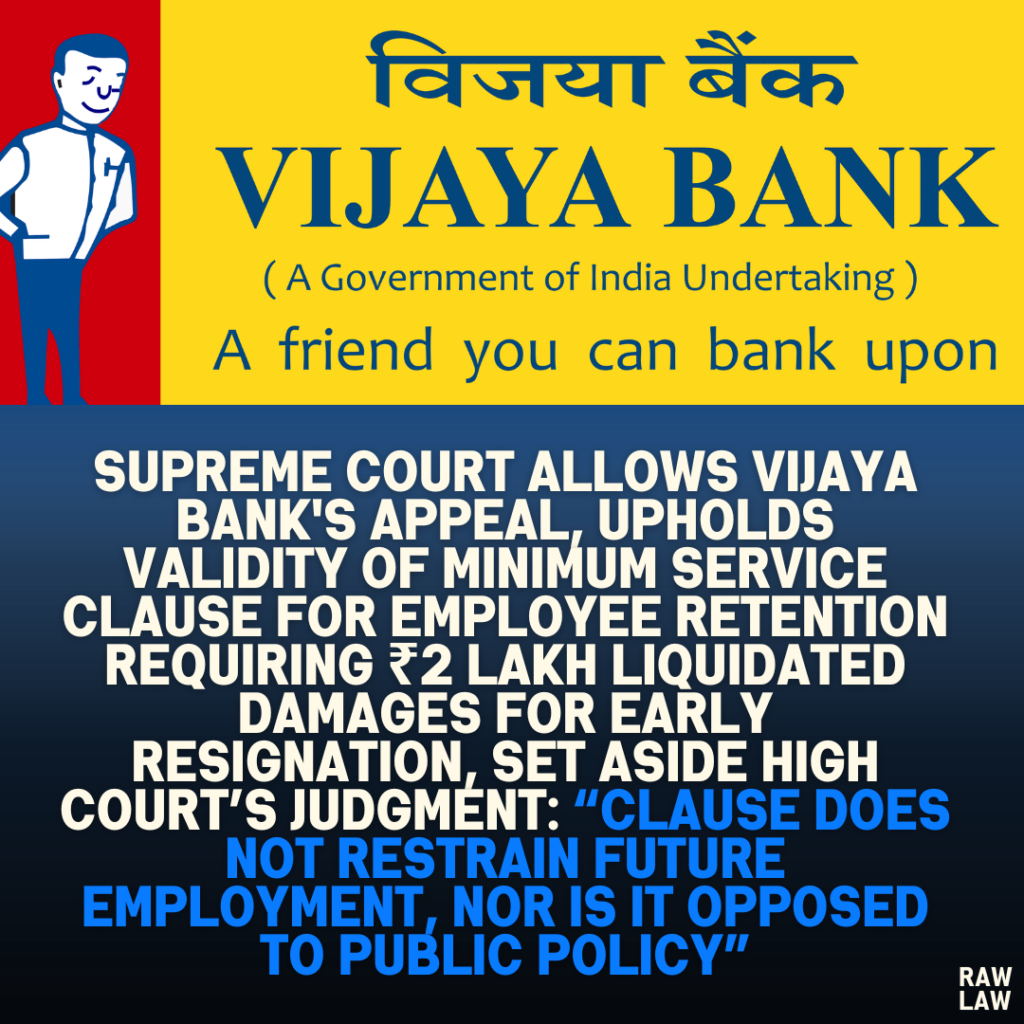Court’s Decision
The Supreme Court allowed the appeal filed by Vijaya Bank and set aside the High Court judgment which had quashed Clause 11(k) of the appointment letter requiring an employee to pay ₹2 lakhs as liquidated damages if they resigned before serving three years. The Court held:
“The restrictive covenant in clause 11(k) of the appointment letter does not amount to restraint of trade nor is it opposed to public policy.”
In a connected appeal raising a similar issue, the Supreme Court upheld the High Court’s decision dismissing the employee’s challenge.
Facts
- The respondent initially joined Vijaya Bank in 1999 as a Probationary Assistant Manager and was promoted over time.
- In 2006, a fresh recruitment notification was issued for 349 officer posts, requiring selected candidates to sign an indemnity bond of ₹2 lakhs to serve at least three years.
- The respondent applied for the position of Senior Manager, was selected, and accepted the terms in the appointment letter dated 07.08.2007, including Clause 11(k).
- He voluntarily resigned from his previous position and joined the new post on 28.09.2007, executing the required bond.
- On 17.07.2009, before completing three years, the respondent resigned to join IDBI Bank and paid ₹2 lakhs “under protest.”
- He then approached the High Court challenging Clause 11(k) as violative of Articles 14 and 19(1)(g) of the Constitution and Sections 23 and 27 of the Indian Contract Act.
- The High Court allowed the writ petition and directed the refund of ₹2 lakhs.
Issues
- Whether Clause 11(k) of the appointment letter is hit by Section 27 of the Indian Contract Act as a restraint on trade.
- Whether the clause is opposed to public policy under Section 23 of the Contract Act and violates Articles 14 and 19 of the Constitution.
Petitioner’s Arguments (Vijaya Bank)
- The clause was intended to ensure employee retention for organizational efficiency.
- The clause was not a post-employment restraint but a condition during service, thus not attracting Section 27.
- Premature resignations disrupted banking operations and forced repeated recruitment drives, incurring financial and administrative burdens.
- The liquidated damages of ₹2 lakhs were reasonable for senior-level officers drawing lucrative salaries.
Respondent’s Arguments
- The clause was part of a standard form contract imposed through unequal bargaining power.
- It was unreasonable, coercive, and disproportionately high, resulting in unjust enrichment to the bank.
- Payment was made under protest, and the clause violated fundamental rights and public policy.
Analysis of the Law
Section 27 – Restraint of Trade:
- The Court reiterated that restrictions during the term of employment are not per se in restraint of trade unless they are unconscionable.
- It relied on Niranjan Shankar Golikari v. Century Spinning & Manufacturing Co. and Superintendence Co. (P) Ltd. v. Krishan Murgai, which distinguished between valid in-service restraints and post-employment ones.
Section 23 – Public Policy:
- The Court examined Central Inland Water Transport Corp. v. Brojo Nath Ganguly on standard form contracts and public policy.
- Held that while courts must be cautious about contracts born from unequal bargaining power, each term must be examined in context.
Precedent Analysis
- Niranjan Shankar Golikari (1967) – Restrictive covenants during service not considered restraint of trade unless unconscionable.
- Superintendence Co. v. Krishan Murgai (1981) – Affirmed enforceability of in-service restrictions.
- Brojo Nath Ganguly (1986) – Held unconscionable clauses in standard form contracts void for being against public policy.
- Haryana Financial Corporation v. Jagdamba Oil Mills (2002) – Emphasized contextual application of judgments.
Court’s Reasoning
- The clause merely imposed a condition of minimum service with liquidated damages and did not restrict future employment.
- The requirement was tied to the operational needs of a public sector bank operating in a competitive deregulated economy.
- Imposing liquidated damages served a legitimate business interest and was not unconscionable given the respondent’s senior managerial status.
- The High Court erred in applying BEML (K.Y. Venkatesh Kumar) without considering that it involved a broader restriction, including a bar on future employment.
- Each clause must be interpreted in the factual context of the case.
Conclusion
The Supreme Court upheld Clause 11(k) of the appointment letter and allowed the appeal filed by the bank. The Court found no merit in the respondent’s challenge to the clause, either under the Contract Act or the Constitution.
Implications
- Public sector banks and similar institutions can enforce minimum service clauses with reasonable liquidated damages.
- Courts will uphold such clauses if they are framed in furtherance of contractual obligations and not in restraint of future employment.
- Highlights the need for employees to be cautious before entering service contracts with minimum tenure clauses.
- Clarifies that public policy evolves with economic realities like liberalization and competition, and enforceability of contract terms will reflect that shift.
